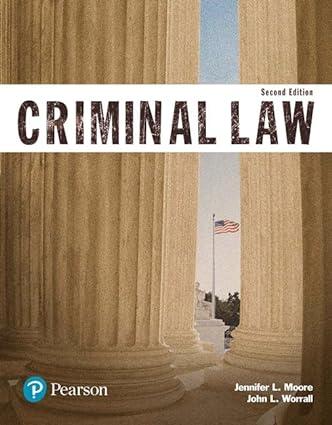Defendant and a friend, Jude Mari (Mari), were at a mutual friends home. Upon preparing to leave
Question:
Defendant and a friend, Jude Mari (Mari), were at a mutual friend’s home. Upon preparing to leave the residence, Mari noticed that Defendant was intoxicated and offered to drive for him. They got into Defendant’s car. Mari drove and Defendant was a passenger. Mari drove the vehicle for a short distance when the car stalled and would not restart. Mari testified that he steered the vehicle as close as he could to the curb and parked it. Mari further testified that he then took the keys out of the ignition, placed them under the seat, and placed bricks under the front and back tires of the vehicle. Mari instructed Defendant not to leave the vehicle and then left in search of help.
. . . (Officer) Longobardi testified that, upon approaching the vehicle, he saw Defendant passed out behind the steering wheel of the car. He further testified that the key was in the ignition, the ignition was turned on, the transmission was in drive, and Defendant had his foot on the brake. The officer aroused Defendant, who spoke to Longobardi in a slurred manner. Longobardi smelled alcohol on Defendant’s breath and noticed that Defendant had red, bloodshot eyes. On cross-examination, the officer admitted that he did not inquire of Defendant whether he had driven the vehicle to that location, or why the car was sitting there.
. . . Defendant was transported to the Bernalillo County Detention Center where he submitted to breath tests which produced readings of .17 and .15. In the metropolitan court proceedings, Defendant was found guilty of DWI.
. . . Defendant next argues that there was insufficient evidence to support his conviction because the State failed to prove that he intended to drive the car. Although the parties appear to use specific intent and general intent interchangeably, general intent is all that is at issue in this case. DWI does not require an intent to do a further act or achieve a further consequence, such as is ordinarily required in specific intent crimes. Defendant argues that since he was not conscious of his wrongdoing, he cannot have the intent he says is required to sustain a DWI conviction. We disagree.
New Mexico’s DWI statute states in part that “[i]t is unlawful for any person who is under the influence of intoxicating liquor to drive any vehicle within this state,” and further, “[i]t is unlawful for any person who has one-tenth of one percent or more by weight of alcohol in his blood to drive any vehicle within this state.” Section 66-8-102(A), (C). Our primary focus is to give effect to the intention of the legislature. In doing so, we examine the language used in the relevant statute. Section 66-8-102 makes absolutely no reference whatsoever to a required intent on the part of an accused. Rather, the statute clearly provides that the only thing necessary to convict a person of DWI is proof that the defendant was driving a vehicle either under the influence of intoxicating liquor or while he had a certain percentage of alcohol in his blood.
Questions:
1. What level of mens rea, if any, is required to convict the defendant of driving while intoxicated (DWI)?
2. Why would a state want to make DWI a strict liability crime?
Step by Step Answer:






